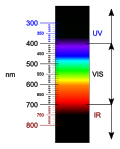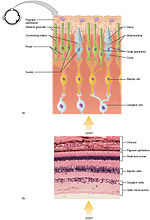Melanopsin is a type of photopigment belonging to a larger family of light-sensitive retinal proteins called opsins and encoded by the gene Opn4. In the...
39 KB (4,525 words) - 07:01, 5 April 2024
Intrinsically photosensitive retinal ganglion cell (redirect from Melanopsin-containing ganglion cell)
(ipRGCs), also called photosensitive retinal ganglion cells (pRGC), or melanopsin-containing retinal ganglion cells (mRGCs), are a type of neuron in the...
26 KB (3,118 words) - 05:44, 25 July 2024
light-dark cycles. He also described the role of melanopsin in ipRGCs. Using a rat melanopsin gene, a melanopsin-specific antibody, and fluorescent immunocytochemistry...
30 KB (3,431 words) - 20:02, 10 September 2024
Opsin (section Melanopsin)
visual transduction cascade. Another opsin found in the mammalian retina, melanopsin, is involved in circadian rhythms and pupillary reflex but not in vision...
83 KB (8,995 words) - 19:04, 16 October 2024
example, melanopsin has an absorption range of 420–540 nm and regulates circadian rhythm and other reflexive processes. Since the melanopsin system does...
37 KB (4,028 words) - 13:14, 31 October 2024
the primary factors affecting the circadian rhythm is the excitation of melanopsin, a light sensitive protein that absorbs maximally at 480 nm, but has at...
25 KB (2,787 words) - 19:58, 5 October 2024
the intrinsically photosensitive ganglion cells of the retina is called melanopsin. These cells are involved in various reflexive responses of the brain...
26 KB (2,939 words) - 00:26, 2 November 2024
it is directly collected by these RGCs. The RGCs use the photopigment melanopsin to absorb the light energy. Specifically, this class of RGCs being discussed...
27 KB (3,166 words) - 22:57, 1 July 2024
(born 29 June 1965) is an American neuroscientist and the discoverer of melanopsin, an opsin found in specialized photosensitive ganglion cells of the mammalian...
15 KB (1,673 words) - 16:29, 1 September 2024
Visual cycle (section Melanopsin visual cycle)
rod and cone pigments, melanopsin has the ability to act as both the excitable photopigment and as a photoisomerase. Melanopsin is therefore able to isomerize...
11 KB (1,373 words) - 00:19, 8 November 2023
any potential role would be secondary to the better established role of melanopsin (see also Intrinsically photosensitive retinal ganglion cell). Sensitivity...
16 KB (1,938 words) - 11:34, 23 August 2024
involved in conscious vision: rod opsins and cone opsins. (A third type, melanopsin in some retinal ganglion cells (RGC), part of the body clock mechanism...
58 KB (6,871 words) - 13:20, 30 October 2024
intrinsic photosensitivity of ON alpha RGCs is driven by melanopsin, which was confirmed using melanopsin-deficient (Opn4-/-) mice, as the ON alpha RGCs in these...
23 KB (2,342 words) - 12:45, 13 August 2024
photosensitive retinal ganglion cells (ipRGC), which contain the photopigment melanopsin. The axons of the ipRGCs belonging to the retinohypothalamic tract project...
7 KB (876 words) - 14:29, 1 September 2023
et al. (2005). Giant retinal ganglion cells contain a photo-pigment, melanopsin, allowing them to respond directly to light. They also receive connections...
2 KB (238 words) - 10:18, 9 July 2024
In recent years, data have supported melanopsin as the main circadian photoreceptor, in particular melanopsin cells that mediate entrainment and communication...
59 KB (6,478 words) - 20:52, 2 October 2024
melanopsin. The Hesse organs (also known as dorsal ocelli) consist of a photoreceptor cell surrounded by a band of microvilli and bearing melanopsin,...
63 KB (6,459 words) - 09:40, 2 November 2024
cones of vertebrates that are responsible for visual perception, but also melanopsin and others. Biological pigment Epstein, R.J. (2003). Human Molecular Biology:...
3 KB (328 words) - 02:33, 16 July 2021
circadian clock is established via light induction of PER. Light excites melanopsin-containing photosensitive retinal ganglion cells which signal to the suprachiasmatic...
19 KB (2,243 words) - 23:46, 9 September 2024
light. The photopigment of the retinal photosensitive ganglion cells, melanopsin, is excited by light mainly in the blue portion of the visible spectrum...
61 KB (7,689 words) - 05:59, 2 November 2024
2002 "Melanopsin-containing retinal ganglion cells: architecture, projections, and intrinsic photosensitivity", 1579 citations 2003 "Melanopsin and rod–cone...
12 KB (1,266 words) - 11:24, 22 August 2024
Kumbalasiri T, Rollag MD, Isoldi MC, Castrucci AM, Provencio I (March 2007). "Melanopsin triggers the release of internal calcium stores in response to light"...
145 KB (16,706 words) - 00:59, 29 October 2024
(OPN1LW, OPSR) (red-sensitive opsin) Opsin 3, Panopsin (OPN3) Opsin 4, Melanopsin (OPN4) Opsin 5 (OPN5, GPR136) Retinal G protein coupled receptor (RGR)...
25 KB (2,172 words) - 01:01, 29 November 2023
light-sensitive cells in the retina, including rod and cone photoreceptors and melanopsin ganglion cells, will send signals to the oculomotor nerve, specifically...
24 KB (2,817 words) - 11:46, 17 April 2024
Jordan M. Renna; Glen T. Prusky; David M. Berson; Samer Hattar (2010). "Melanopsin-Expressing Retinal Ganglion-Cell Photoreceptors: Cellular Diversity and...
29 KB (3,276 words) - 01:00, 17 July 2024
Baltimore, MD. He is best known for his investigation into the role of melanopsin and intrinsically photosensitive retinal ganglion cells (ipRGC) in the...
7 KB (628 words) - 16:56, 2 November 2024
difference in absorbance by these photopsins (see image). Color blindness Melanopsin Retinylidene protein Rhodopsin Visual cycle Visual phototransduction Terakita...
10 KB (1,049 words) - 21:31, 14 July 2024
Kumbalasiri T, Rollag MD, Isoldi MC, Castrucci AM, Provencio I (March 2007). "Melanopsin triggers the release of internal calcium stores in response to light"...
33 KB (3,318 words) - 20:15, 11 September 2024
her evidence of a novel photopigment in humans, later discovered to be melanopsin. She was also involved in discovering links between human PER3 genotype...
20 KB (2,209 words) - 20:41, 16 March 2024
to the giant retinal ganglion cells, contain their own photopigment, melanopsin, which makes them respond directly to light even in the absence of rods...
30 KB (3,656 words) - 16:52, 22 October 2024





















